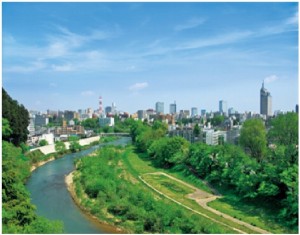 The Digital Garden City Nation Initiative is Prime Minister Kishida’s plan to promote digitalisation, eliminate the gap between rural areas and cities and stimulate regional economic revitalisation. Digital infrastructure will be improved across the country, creating a society where anyone can benefit from digitalisation.
The Digital Garden City Nation Initiative is Prime Minister Kishida’s plan to promote digitalisation, eliminate the gap between rural areas and cities and stimulate regional economic revitalisation. Digital infrastructure will be improved across the country, creating a society where anyone can benefit from digitalisation.
The initiative aims to improve digital infrastructure by laying high-speed cables and improving 5G throughout Japan. The plan is to complete a network of submarine cables creating a digital superhighway within three years. Furthermore, extending 5G reach will provide coverage for 90 percent of the Japanese population by March 2023.
As part of the Digital Garden City Nation Initiative, the government also hopes to develop human resources with digital skills. Residents will soon see the launch of a training programme to promote digitalisation in local areas, instructing 450,000 personnel each year by 2025, increasing to 2.3 million people by 2026. The government will also send human resources specialists working on regional development through digitalisation to 100 regions in Japan.
Stakeholders will hold technology training courses for residents to ensure accessibility to the benefits of digitalisation. These courses will be primarily for the elderly. The Digital Promotion Committee will collaborate with local businesses and initiatives to provide programmes that assist people unfamiliar with digital services. Available courses include how to use a smartphone, introductions to messaging apps and social media, and online administrative application services, such as the My Number Card online application.
The Digital Garden City Initiative aims to deliver many new digital services, targeting various areas such as agriculture, education and business. With help from the Data Society Alliance, technology will link data from local government services, such as disaster prevention or social welfare, and private services, such as medical care or transport. For example, in the event of heavy rain, digital maps created from data collected by tide level sensors can inform local government officials of any flooding risks. In turn, residents can access current evacuation information digitally and be alerted automatically via mobile phone.
By creating a more technologically proficient society, the Digital Garden City Nation Initiative aims to alleviate problems caused by the declining birth rate, ageing and isolation, and the over-concentration of services in Tokyo. For example, mobility services, such as mobile clinics, hope to eliminate regional medical disparities, and automated drone delivery of packages and groceries can tackle some of the problems encountered by depopulated areas.
The importance of digital services worldwide has come to the fore during the pandemic, and Japan is not alone in working towards a more technologically proficient population. By extending the accessibility of digital services, the Digital Garden City Nation Initiative hopes to revitalise rural areas and ensure fair access to online services for all, regardless of age, disability, geographical restrictions or financial situation.

